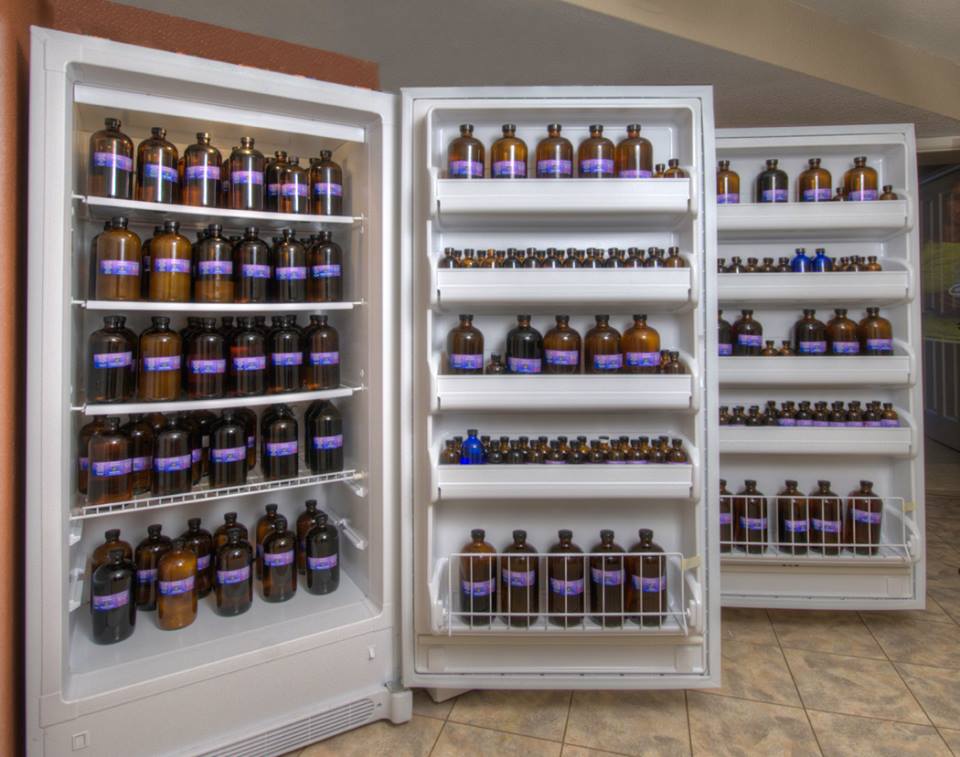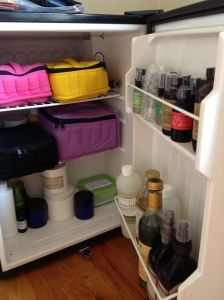Lemon on the rocks: keep your essential oils cool
Essential oils are happiest when cold.
If you keep them refrigerated they will last twice as long, especially if you live in a warm climate. Essential oils are expensive, so you want them to stay active as long as possible!
Cold good, oxidation bad
With time, most essential oil constituents oxidize, and heat promotes oxidation. Once oxidation starts it’s difficult to stop, though it is a very slow process – it takes months. So if you accidentally leave your oils in a hot car for a few hours, don’t worry – they will still be fine. And, changing temperature either way does not bother them, so long as they are cool most of the time.
Citrus fruit oils are high in limonene, and limonene is especially prone to oxidation. As it oxidizes, the percentage of pure limonene in your lemon oil decreases significantly, because it is being oxidized into other substances. There are two consequences of this:
* Because your lemon oil no longer contains as much limonene, it no longer does what it’s supposed to do! As the limonene oxidizes, the therapeutic potential of the oil decreases.
* The chemicals formed – mostly oxides and peroxides of limonene – are not very pleasant, not very therapeutic, and they increase the risk of skin sensitization from the lemon oil. The risk is still small, but it’s no longer negligible.
The limonene content of lemon oil decreased from 67.1% to 30.7% in 12 months when the oil was stored at 77°F (25°C) with the cap removed for three minutes every day. However storage at 41°F 5°C, with the cap removed for three minutes only once a month, resulted in minimal degradation (Sawamura et al 2004). When lemongrass oil was intentionally oxidized, it lost almost all of its antibacterial activity (Orafidiya 1993) .
The ideal temperature
35-38 degrees, the temperature of most refrigerators, is great for essential oils. If you fancy keeping them in your freezer that’s OK too, but the additional cooling won’t bring much added benefit. A couple of things to watch out for:
* If you put essential oil bottles into a fridge with food, some of that food may start to taste of essential oil. So keep them in a container: wooden box, plastic box or zip-up bag (see pic below). If you have a large collection of oils, or plan to, buy a dedicated fridge – they come in all sizes.
* Essential oils become progressively more viscous as they cool. This won’t noticeably affect most oils, but some may be slow to pour, and rose otto will go solid. (If it’s undiluted rose otto and it doesn’t go solid in your fridge, then it’s not a genuine otto.) If you do need to slightly warm up an essential oil, hold the bottle in your hand for a minute. But most will be fine.
How to tell if an essential oil has oxidized
* It will not smell as fresh as it did. You may not notice, as the change is very slow, but when you buy a new oil you may see the difference.
* Citrus oils sometimes go cloudy. Watch out for this. If it happens, let the sediment settle to the bottom of the bottle. This will take several hours. Then use a clean pipette to transfer the good oil into another bottle, and toss the one with the sediment.
Don’t rely on tester oils in stores as a guide to what a fresh oil should smell like. These testers are constantly being opened and exposed to the air, so many of them are probably well on the road to being oxidized. (But, the oils for sale are still good, because they are sealed!)
How long will my essential oils keep?
It depends when you start the clock. If you time it from the moment of distillation, you have to know when that was, and most of the time we don’t know that. And, an essential oil in a full, unused bottle will stay fresh for a long time. So – start the clock when you first open the bottle, and use the following guideline for essential oils that are refrigerated:
Citrus fruit, neroli, lemongrass, frankincense, tea tree, pine and spruce oils
1-2 years
Virtually every other essential oil
2-3 years
Sandalwood, vetiver, patchouli
4-8 years
For non-refrigerated oils, halve these numbers, especially in warm climates. Keep it simple: keep them in a fridge! If you haven’t kept your essential oils refrigerated up to now, it’s not too late to start.
Some other tips
Use your deceased oils in household cleaning products, especially citrus fruit oils. Or trash them.
- For long-term storage, undiluted essential oils should be kept in colored glass containers.
- Keep bottles capped when not using.
- Essential oils are inflammable – never leave naked flame burners unattended.
- Always keep essential oils where small children cannot get to them. Accidents have occurred from toddlers ingesting essential oils.
References
Orafidiya LO 1993 The effect of autoxidation of lemongrass oil on its antibacterial activity. Phytotherapy Research 7:269-271
Sawamura M, Son U-S, Choi H-S et al 2004 Compositional changes in commercial lemon essential oil for aromatherapy. The International Journal of Aromatherapy 14:27-36





Please, please, PLEASE tell me that Sandalwood doesn’t REALLY only last 5 years. I bought a HUGE bottle of mysore MANY years ago. Opened it once just to sniff and dream. And put it away. Okay, not HUGE, but as I was not planning on ever using it much, it didn’t matter. I WAS planning on keeping it to sniff and then give to which ever kid fought hard enough for it after I popped my clogs… Seriously? Only 5? Too chicken to pull it out and sniff it now.
Thanks again for providing a wealth of information. I currently have a refrigerator designated for my essential oils. Thank you also for the references. I am really looking forward to purchasing Essential Oil safety in two months.
Yolanda
Caetlyn, it sounds like you have quite an investment there! It will continue to smell beautiful for 20 years or more, but the (therapeutic) santalols eventually degrade into other compounds. A larger bottle with very little air space could still be good after 10 years. So, the great smell will outlast the therapeutic aspect. Either way the cooler it is, the longer it will last.
Robert thank you for always being so informative. Are there some essential oils that fall outside of this rule and should not be refrigerated?
Scented regards
Aseyah
Aseyah, no. Refrigeration will not damage any essential oil, and will extend shelf life for all of them. For similar reasons we keep many fresh foods, herb extracts, hydrosols etc. cool.
Another really helpful blog post Robert, thanks! You taught us this in the first essential oils weekend seminar & I’ve been doing it ever since. But, what about oils like Anise that crystallize when cold? Would you still keep it refrigerated and then slightly warm it before using? (ps We just got another sign-up for your November seminar this morning!)
Thank you Lori, essential oils with constituents that may crystallize when refrigerated include rose, zdravetz, anise and fennel. Yes, do refrigerate these – gentle warming is all that is required, and with a small bottle this can be achieved by holding it in your hand.
I think you mean essential oils are FLAMMABLE (not inflammable)
Sheryl, you’re partly right, in that “flammable” is more used today (showing my age..) but both words have the same meaning: http://chemistry.about.com/b/2011/01/08/flammable-versus-inflammable-what-is-the-difference.htm
Thank you for another GREAT and informative article, Robert! Now where did I leave that little refrigerator….? 🙂
Thanks so much for the very useful information! I have been thinking of buying a wine cabinet (those for storing wine in a cool environment but not at too low a temperature) for my oils as I was told that this will keep the oils cool while minimising great temperature change, as we would probably put in and take out oils for use constantly…I was told that constant temperature change will accelerate the deterioration of oils. Is this true? Should I better invest in a wine cabinet or in a fridge?
Many thanks and look forward to hearing from you soon!
Thanks so much, Robert, for this important and practical information. I used to believe essential oils were invincible! I reposted this. Thanks again!
Hi Dawn, I would buy a fridge, preferably one where you can control humidity and keep this low. But you could do either. Wine coolers are generally built for a temperature range of 45-55 F, and a fridge works well 35-38. So your oils will probably keep longer in a fridge. In my opinion, the thing about temperature change accelerating deterioration is bunkum.
Thanks so much Robert! Really grateful for your prompt response, and indeed very happy to have access to your opinions in this direct manner.
Thanks again!
Just the other day, I pulled out my e/oils to make a blend and discovered that all my carriers had gone bad. I moved to Florida from Canada last year and have stored my oils in a cupboard in the bathroom, only to discover that now over half of them have gone rancid. Lesson learned. I have now made space in my fridge for the few that I have left until I can replace them. Going to buy a small “beer” fridge just for my oils.
Hi there
I received a mortified look & telling off from a medical herbalist colleague when explaining that I kept my root ginger in the freezer. She explained that this would alter the healing properties (maybe five elements etc?) & when I mentioned citrus essential oils being stored in a fridge to extend their ‘life’ she was similarly concerned…. Any thoughts?
Thank you for being accessible 🙂
Hi Robert,
Will the condensate due to the difference in temperature affact the quaility of the essential oil?
Tavis
Thank you
Wow!!! I am so looking forward to reading your information. Have just gotten interested in oils. Plan to learn how to mix, etc; Thank you.
Michelle, I don’t know about keeping root ginger in the freezer, but keeping your essential oils in the fridge will PREVENT them losing their healing properties through oxidation.
Tavis, if you keep essential oils in the fridge, there should not be any water condensation at all inside the bottle. If there was, this would be a problem.
Hello!
Thank you for this very informative post! I am now considering ways to keep hem safe in the fridge. (Small bottles….big fridge…..probably not the best combination, but I’m working it out.) I do have a question about Citrus oils, though.
On the bottle of my orange oil it says that the oil may become cloudy when exposed to cold temperatures. How do I tell the difference between cold cloudy and bad cloudy? Also, is there something I need to do with the bottle to make the sediments settle in a citrus oil?
Thanks again!
Rachael
Hi Rachael, I have never seen a citrus oil go cloudy when cold, so I’m puzzled by that statement. But if an oil does only go cloudy when cold, then it’s not a problem. Sediment, on the other hand, is there at any temperature, and sinks to the bottom of the bottle – you don’t need to do anything except let it sit for a couple of hours.
Very interesting reading. Thank you, Robert. One question: is refrigeration helpful for UN opened bottles, or are they okay until opened? I’ve had several bottles, unopened for years. I appreciate your help.
Hi Sarah, it’s less important, but it can still make a difference. Depends how long the oil has been stored, and at what temperature.
I found this website through Google after researching a concern of mine. I recently made a homemade gel air freshener tea tree oil and I put it in my refrigerator to set. Well, all of my food now smells and tastes a little “fresh”. I don’t mind except that I have felt sick the past two times I have eaten. Do you think that an essential oil can affect food to the point where it can make a person ill?
Hi Darcy. Yes, foods can and do absorb essential oils if they are stored together, and one way to minimize this is to keep the essential oil bottles in a zip pouch or similar. But ideally, use a dedicated fridge for essential oils etc. Fridges come in all sizes.
SIR,
KEEPING MY OILS IN FREEZER IS MORE CONVENIENT FOR ME….WILL IT HARM MY OILS? WILL THEY FREEZE?
Hi Cade, no it will absolutely not harm them, though some may become thicker. Make sure caps are on firmly so no moisture gets into bottles.
Hi Robert, thanks for the article. Could I ask about storing oils in coloured glass, I am seeing a lot of massage oils being sold in clear glass bottles these days and I thought that was a big no no for aromatherapy. Mostly I have come across this with luxury spa brands, they are in a box but wouldn’t the light effect the oil after we remove it from the box and keep in our house to use? Thanks
Hi Geoff, that’s a good question, and yes this can be an issue if such containers are left exposed to moderate sunlight for a month or more. But, kept in dim light or for up to a few weeks, not a problem.